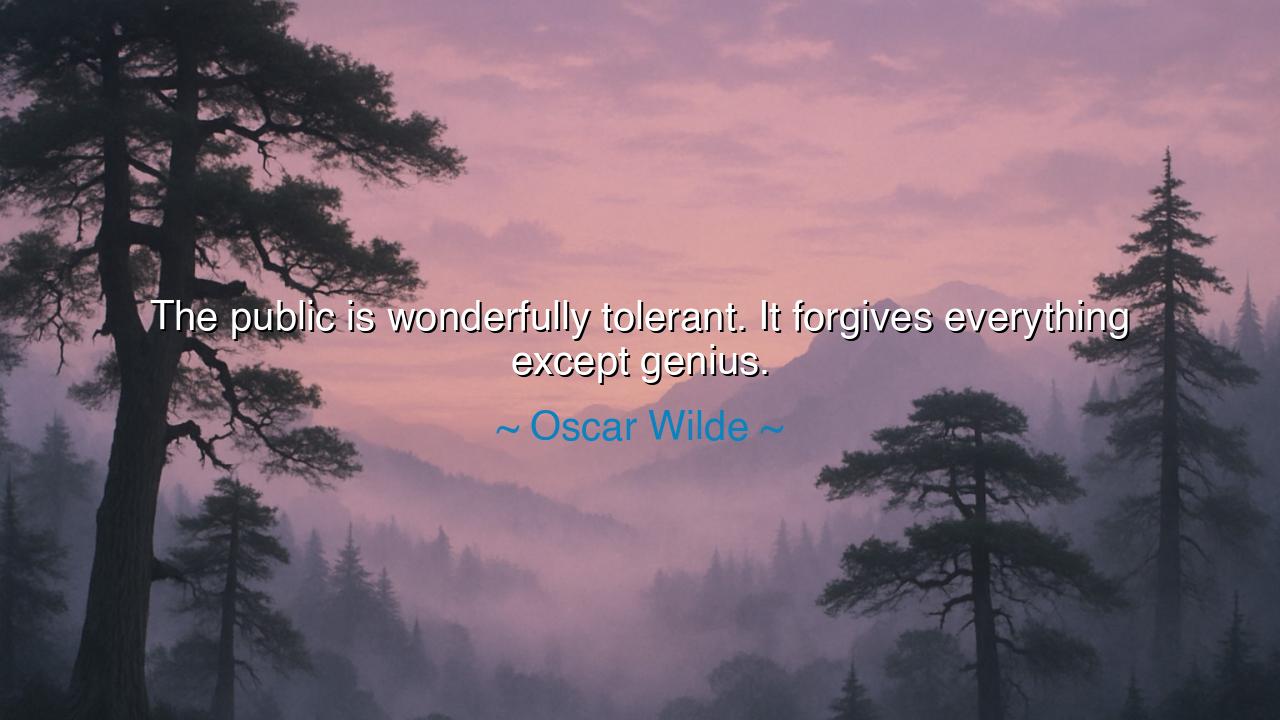
The public is wonderfully tolerant. It forgives everything except






When Oscar Wilde wrote, “The public is wonderfully tolerant. It forgives everything except genius,” he spoke not merely as a man of letters, but as a prophet of truth about human nature. Wilde, who lived and died under the weight of both admiration and condemnation, understood the paradox of society’s heart. He saw that the public, so quick to applaud mediocrity and forgive folly, often turns cold when faced with the brilliance that challenges it. For genius does not flatter the world—it confronts it. It reveals truths too sharp for comfort, mirrors too clear for vanity, and thus, though the world hungers for enlightenment, it often crucifies its bringers.
To be a genius, in Wilde’s world and in ours, is to stand apart from the crowd—to see what others cannot see, and to say what others dare not speak. The public, accustomed to its familiar illusions, forgives the thief, the fool, the hypocrite—but it rarely forgives the one who exposes them. It welcomes laughter but fears reflection; it embraces charm but resents depth. Wilde, whose wit was a blade gilded with beauty, knew this pain intimately. He was loved as an entertainer, but despised as a thinker. When his genius became too great to remain a performance—when it began to speak of truth, freedom, and love unbound by convention—the world that once cheered him turned away.
This truth is older than Wilde himself. Socrates, too, was condemned by the public of Athens, not for evil, but for asking too many questions. His wisdom made others uneasy, for he forced them to see the limits of their own understanding. And so they called his teaching corruption, his insight heresy, and sentenced him to drink poison. The city that prided itself on philosophy could forgive the liar and the coward, but not the genius who showed it its own ignorance. Such is the eternal fate of those whose light shines too brightly—it blinds those still unready for dawn.
We see the same story in Galileo, who raised his eyes to the heavens and dared to say what truth revealed—that the Earth was not the center of the universe. For that, he was condemned by the very institutions that claimed to uphold truth. The public, swayed by fear and pride, could forgive superstition and sin, but not the brilliance that shattered illusion. History, time and again, proves Wilde’s lament: society may tolerate the wicked, but it mistrusts the visionary. For genius threatens to remake the world, and the world fears nothing more than change.
Yet Wilde’s words are not merely an accusation—they are a mirror. He reminds us that the fault lies not only in the crowd, but in the timid heart within each of us. How often do we turn away from genius in our own lives—from ideas that disturb our comfort, from people whose greatness stirs our envy, from truths that demand transformation? We call them impractical, arrogant, or strange, not because they are false, but because they awaken the part of us that longs to be more. To forgive genius is to forgive our own smallness—and few dare that humility.
The meaning of Wilde’s wisdom, then, is both tragic and liberating. It tells us that genius will always walk a lonely road, but it also calls us to be better witnesses. It is a challenge to the soul: to see brilliance and not shrink from it, to honor originality even when it unsettles us. The public may resist the light, but individuals—those who think, who feel, who dare—can learn to welcome it. For the world advances not by the applause of the crowd, but by the courage of a few who refuse to silence their vision.
The lesson, my child, is this: do not join the chorus that condemns what it cannot understand. When you encounter genius, whether in art, in thought, or in another soul, do not mock it or envy it—listen. Let it challenge you, even if it humbles you. The wise learn from greatness; the foolish are threatened by it. Be among the wise. Defend the daring, protect the new, and nurture your own spark of originality, even when it draws fire from the crowd.
So remember Wilde’s warning, and his courage. The public may forgive your sins, your failures, even your lies—but it will not easily forgive your greatness. Yet do not let that frighten you. For though the world resists the genius in its time, it bows before it in eternity. Be steadfast, be bold, and if your light burns too brightly for the eyes of the present age, know that it was meant to guide those yet to come.






AAdministratorAdministrator
Welcome, honored guests. Please leave a comment, we will respond soon